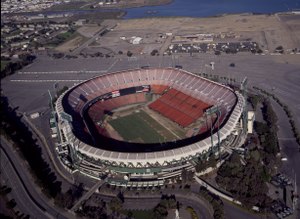 Candlestick Park, the site of the game | |||||||||||||||||||
| |||||||||||||||||||
| |||||||||||||||||||
| Date | September 13, 1992 | ||||||||||||||||||
|---|---|---|---|---|---|---|---|---|---|---|---|---|---|---|---|---|---|---|---|
| Stadium | Candlestick Park San Francisco, California | ||||||||||||||||||
| Favorite | 49ers by 3.5 [1] | ||||||||||||||||||
| Referee | Red Cashion | ||||||||||||||||||
| Attendance | 64,053 | ||||||||||||||||||
| TV in the United States | |||||||||||||||||||
| Network | NBC | ||||||||||||||||||
| Announcers |
| ||||||||||||||||||
The No Punt Game is the nickname given to a National Football League game held between the Buffalo Bills and San Francisco 49ers on September 13, 1992 at Candlestick Park in San Francisco, California. The game was the first in NFL history to see no punts by either team, as the Bills and 49ers, led by quarterbacks Jim Kelly and Steve Young, respectively, combined for 1,086 total yards of offense, with both quarterbacks passing for over 400 yards. [2] [3] Promoted as a potential Super Bowl "preview", the No Punt Game featured several players now enshrined in the Pro Football Hall of Fame, including Kelly, Young, Andre Reed, James Lofton, Jerry Rice, Thurman Thomas and Bruce Smith. It is remembered as one of the greatest games ever played. [4]